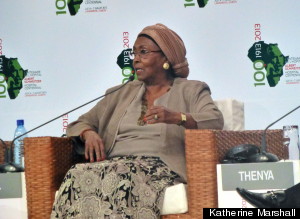Khadiga Hussein is one determined lady. Her cause is peace -- an end to violence of all kinds, national and domestic, communal and individual. She founded and has led the Sudanese Mothers for Peace and Development movement for 25 years. Now she's itching to find new ways to make her point and achieve her ends.
Edna Adan Ismail is elegant and tough. Calm but relentless determination is etched across her face. One of the world's leading voices against female genital cutting, she's built a hospital that serves women in one of the world's most troubled spots, Somaliland and the surrounding region.

Khadiga and Edna exemplify Muslim women who draw on the values of their faith both to define their goals and to design their means. They work outside any framework of religious authority, in part because it has no place for women like them, and partly because they see their work as transcending any specific faith tradition and its constraints. Faith, for them, is about life's goals and what they can do to help.
I had the chance to talk to them both (Khadiga in Switzerland, Edna in Gabon) this month and came away inspired by the lessons they offer about how women fight for what they believe is right, their deep honesty and commitment, and how their religious traditions inflame core values that they define and adapt in the context of the lives they lead.
Mama Khadiga (as she is known) served as a Sudanese government official, her husband is a general, but it was her role as a mother that enraged her during the long and bitter conflicts in Sudan. Her current demands reflect the strong maternal flavor of her movement ("right now" and "nasty killing"):
"Now: on behalf of 8,000 mothers, we appeal to all parties to stop this nasty killing of each other right now and to sit down for peaceful political negotiation to secure peace, justice, human rights and democracy to every citizen in Sudan."
The coalition of mothers brings together women from different religious and ethnic groups, and from the Sudan's bitterly divided regions. They include village and elite women, joined by disgust at the killing of their sons and daughters. The coalition offers a way for the mothers to express their sorrow and impatience and to seek action. As Khadiga says, "Mothers are mothers. We open our mouths and say loudly that we don't agree to any solutions that come from guns." Meanwhile the coalition works to a broad agenda for peace, pressing to end such ills as female genital cutting and child marriage. Current plans call for a large demonstration of women, in hopes that it will capture national and international attention and force the, mainly, men who hold power to bring peace to Sudan and its neighbors.
I asked Khadiga how she dealt with religious leaders and tensions. At first she ducked the question, but as we talked it was clear that she combines respect for Islam with a willingness to look at strengths and weaknesses. She named no religious leaders who supported the Mothers, but stressed that she is a good Muslim who cares about her faith. The movement includes women with different religious views and traditions, young and old. A big tent is what is needed to bring them together. But the movement is also built on respect for Sudanese culture in its values and its style. It is this broad appeal and a commitment to the value of trust that, she says, allows women to discuss honestly what they can and must do. They must speak out boldly and demand peace. But they must also work with mothers to change practices that teach sons values of conflict instead of peace, for example through the stories they tell and songs they sing.
Edna also has decades as a fearless advocate behind her. She has faced danger, years of exile, and threats. She too spoke in subtle terms about how her faith inspires her values. Her father, she said, was a deeply religious man, a respected surgeon, who was not afraid of independent thought. She was deeply marked by her father's rage when he returned home from a trip to discover that his wife and relatives had arranged for Edna's circumcision during his absence. His willingness to question cultural norms, taken as religious commands, contributed to her decision to speak out forcefully against the practice and her determination to fight over a lifetime for the rights of women. Values, she says, are not static, and they are shaped by life experience.
Two Muslim women, inspiring in their courage, independent in their thought, brilliant in their tactics, caring and thoughtful in their human response. What Edna and Mama Khadiga do and what they represent offer a wonderful, nuanced glimpse of what is finest in the Muslim faith, during this holy month of Ramadan. The values and qualities include a deep sense of solidarity, a thoughtful view of what identity means, and above all a commitment to helping those who are less fortunate, with courage and determination. We need to celebrate women like them (as well, of course, as men) and what they strive for as part of our understanding of what faith represents, and, more specifically, the special gifts of Islamic values and traditions.
